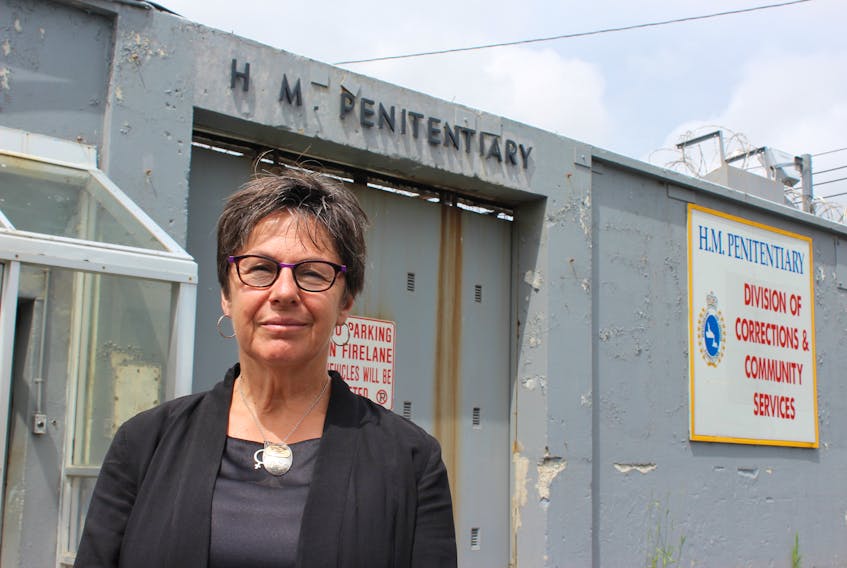As Sen. Kim Pate exited Her Majesty’s Penitentiary on Thursday afternoon, a young man caught her eye.
The man had been released from the prison at 9:30 a.m. He carried a small bag with a few personal belongings and a taxi chit he’d been given to find his way home. He was told the prison had called a cab to help him get home, near Bay Roberts.
Almost five hours later, the man was still standing before the prison gates, waiting to start life again on the outside.
Pate spoke with him, complained to the nearest guards upon hearing of his wait, and a few minutes later a cab arrived to take him where he needed to be.
For Pate, the incident shows how the priorities of the Newfoundland and Labrador justice system appear to begin and end at the prison gates, with not enough resources focused on rehabilitation — the supposed goal of any justice system.
“The last priority should be building a new prison,” said Pate.
“If a new prison is built, it will be filled up with more of the people who have less. It will continue to suck the resources out of the community.”
Pate was appointed to the Canadian Senate in November 2016. She has been an advocate for prison reform across the country for more than 35 years. She’s a former executive director of the Canadian Association of Elizabeth Fry Societies, one of the country’s leading advocacy groups for women and girls in the justice system.
She says the priority should be helping people during and after their incarceration with social programs, education and skills, to help them get over the issues that got them in trouble in the first place.
“The majority of people who end up in prison on any given day are not necessarily people who pose a risk to public safety. They often are the poorest in some parts of the country, they’re racialized, but they tend to be the people who are the most marginalized to begin with,” she said.
“Most of these people don’t need to be here. If there were resources in the community and they could be supervised in the community, that’s where they could be.”
Part of the problem, according to Pate, is mandatory minimum sentencing and the lack of alternatives to prison time found in the justice system. In May, Pate introduced Bill S-251, which would allow judges to ignore mandatory minimum sentences in favour of other means of rehabilitation, at the discretion of the judge. The bill has only been given first reading in the senate, so far.
Pate says rehabilitation, education and addictions treatment has to be the focus, not only to help those incarcerated, but to help the victims, too.
“Mostly what victims want is two things: they want to know why something happened to them and how it can be remedied. Secondly, they want to know what will stop it from happening in the future,” she said.
“The answer to both of those is not more jail, or better jails, or longer time in prison. To hold people accountable, there’s a whole bunch of ways we could do that. They could be contributing in the community building the housing that clearly needs to be built. We could have them go into treatment programs to deal with the past trauma, the addictions, the mental health issues. That’s where we should be investing those resources. For the benefit, not just for those individuals, but for the entire community.”
Politics, of course, plays a role in any decision surrounding the justice system. Pate says shifting the focus from incarceration to rehabilitation shouldn’t be a politically dangerous move.
“Most politicians would say, if we advocate that sort of thing we’re described as being soft on crime. In fact, it’s the complete opposite,” she said.
All that said, she doesn’t think Her Majesty’s Penitentiary is the worst prison in the country — though it’s far from the best.
But it doesn’t matter how well built the prison is, if nothing is being done to help those on the inside prepare for life on the outside.
“Is HMP where I’d want to be? No. But if you locked me in the Sheraton and I wasn’t allowed to leave there, it may physically be a much more comfortable environment,” she said.
“But in the end, if all that happens is I’m locked there and don’t have any way to interact with people, to contribute to community, to deal with any issues I may have, then ultimately it may be a nice prison, but is it actually contributing to improving me?”
Twitter: DavidMaherNL
Get the whole story:
Telegram Special Report explores past, present and future of Her Majesty's Penitentiary
PAM FRAMPTON: Life behind bars — a TRUE story
TIMELINE: Her Majesty's Penitentiary through the years
EDITORIAL: Another decade of darkness
SPECIAL REPORT: No federal cash for HMP
PAM FRAMPTON: New prison requires new ways of thinking
Her Majesty's Penitentiary — ‘This house of Hell’
Inmate's letter speaks volumes about conditions at HMP in St. John's: friend









